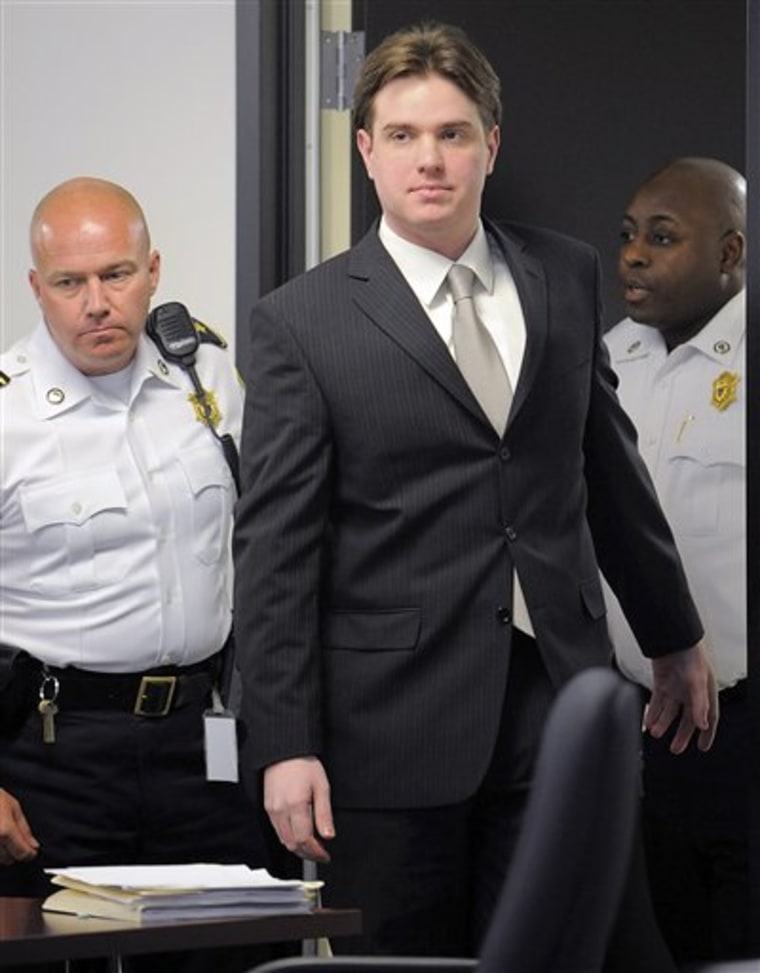In the weeks before his wife and baby daughter were slain, a British man posted a profile on a swingers Web site, saying he was looking to meet "American women of all ages" for sex, a detective testified Thursday at the man's murder trial.
Neil Entwistle, 29, is accused of fatally shooting his 27-year-old wife, Rachel, and their 9-month-old daughter, Lillian Rose, at their Hopkinton home in January 2006. Prosecutors allege Entwistle was despondent over mounting debt and dissatisfied with his sex life.
Medford police Detective Lawrence James testified Thursday that Entwistle used his credit card to buy a monthlong membership to AdultFriendFinder.com in December 2005. In his profile, he described himself as an Englishman who had recently moved to the United States looking for "1-on-1 discrete relationships with American ladies."
The Web site bills itself as "The World's Largest Sex & Swinger Personals Community."
James testified that Entwistle's profile said: "I need to confirm what friends have told me, that you are much better in bed than the women over the ocean. ... We both want the same thing so there is little point dragging it out here."
Later Thursday, state Medical Examiner William Zane testified about the wounds and causes of death for Entwistle's wife and daughter. He said that Rachel Entwistle probably died immediately of a gunshot that penetrated her brain, and that Lillian likely bled to death a minute or two after being shot in the abdomen.
The bullet that struck the girl in the abdomen traveled into Rachel's left breast, where it was later recovered, Zane said. Mother and baby were found cuddled together in bed wearing pajamas, with Rachel's right arm over Lillian's chest.
Defense pushes suicide theory
Defense attorney Stephanie Page aggressively cross-examined Zane, suggesting he shouldn't have ruled out suicide. He repeatedly asked Zane whether he was ever told by investigators that tests on Rachel Entwistle's hands showed gunshot residue on the front and back of both hands.
Zane said he didn't know about the test results, which came back after he completed his autopsy. But he said the presence of gunshot residue could mean one of three things: that Rachel handled the gun, fired the gun or was nearby when it was fired. A state police chemist who testified earlier said gunshot residue could travel 3 feet.
Prosecutors say the .22-caliber handgun used in the killing was owned by Rachel Entwistle's stepfather, Joseph Matterazzo, and was kept in his home more than 50 miles away in Carver. Prosecutors believe Entwistle stole the gun, used it to kill his wife and daughter, drove to Carver, and returned it.
The defense did not offer an explanation on how the gun would have been returned if Rachel Entwistle had committed suicide.
Entwistle told police he returned home from shopping to find the victims dead on a bed in the master bedroom.
After Page's cross-examination, prosecutor Michael Fabbri followed up by focusing on the bullet that entered the baby's abdomen and then went into her mother's breast.
"Have you ever been involved in a suicide where one person tries to inflict their own death by shooting through another person?" Fabbri asked.
"No, I haven't," Zane replied.
